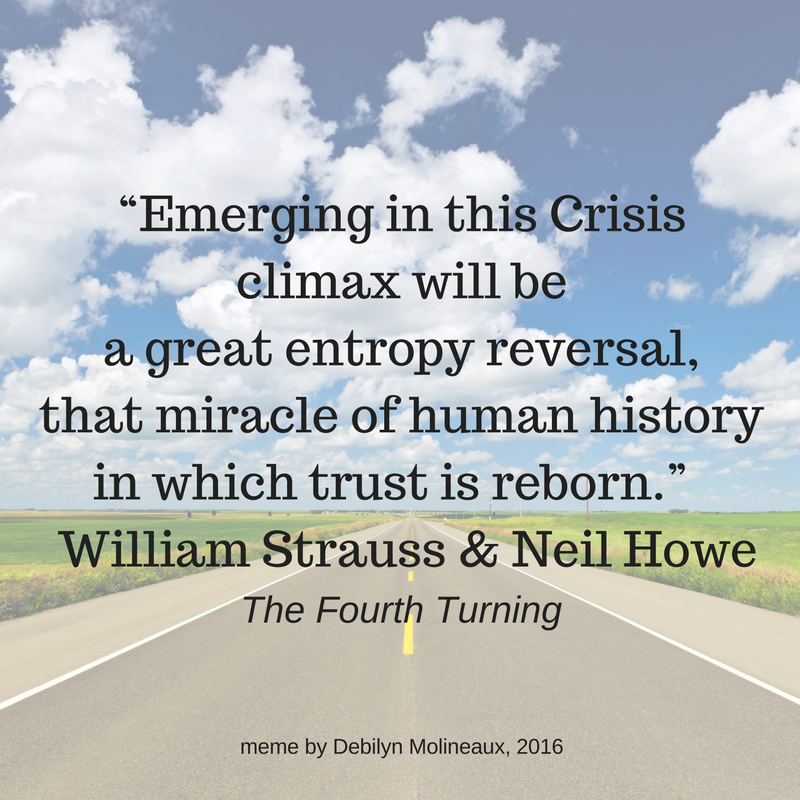Originally published in Bridge Alliance
Debilyn Molineaux, Bridge Alliance
In Part I we explored the cycle of change and in Part II, we reviewed the predictable factions or roles. But what can we learn from this historical view? Is it possible to move through this Crisis without a major or total war? Do we need to suffer as we grow? History would suggest yes. But there is also another choice. And we can also take comfort that after this period of crisis, we will emerge in a largely peaceful era.
A religious friend observed a few years ago that we acknowledge the pending social change through our stories of the future we tell each other. On one hand, the warming of oceans and changing climate conditions seem as though our planet will “die” which is to say, become uninhabitable for humans. On the other, there is a story that “end times” are near and the second coming of Christ will happen any day. Some people are looking forward to 1000 years of heaven on earth following Armageddon.
We all know that change is coming.
How will we face the changes in our future? How will we talk with each other? Solutions are not obvious or easy. But one thing is abundantly clear. We are stuck with each other to work it out. Since we are negotiating – albeit unconsciously – our new social contract, what matters most to you? What matters most to your friends, family and that person that drives you nuts? What are some of the best ideas that we can support and what do we need to leave behind? In Part II, I suggest we need to create a human-centered economy and leave domination culture behind. In other words, more awareness of the needs of community and the needs of individuals.
“Emerging in this Crisis climax will be a great entropy reversal, that miracle of human history in which trust is reborn.” The Fourth Turning by William Strauss & Neil Howe
Culturally, we swing between periods of strong individualism and strong community. Our priorities change according to what is needed. We are moving from individualism towards community now. The longing to “belong” sings in our hearts. So we can prepare by looking to our many communities and work to strengthen them. It may be our neighborhoods, our families, our work and faith. Look around you and check in with the health of your multiple communities. We will need to support each other in ways like our country did during WWII. Everyone had a job to do and did it. We put petty issues aside and did what was required.
We can look at ourselves to note what we can contribute and where we will need support. What are the things we need to get through a crisis. Will it be survival level needs like food, shelter and protection? Will it be needs of the heart? We don’t know, but our history says that we will be called to face it together.
Our relationships with those who have different viewpoints about life are frayed and sometimes nonexistent. We have separated ourselves into camps (some would say tribes) and miss the benefits of vigorous conversation, which builds trust.
If there is one thing which will see us through the coming crisis, it is trust in each other. When you think about your most trusted friends, how did you build trust? Sometimes it happens over time. Sometimes it happens by going through a crisis together. And sometimes it happens by being in a continuous conversation about what really matters to you. When we care about what matters to each other, trust is increased.
Regardless of other aspects of our forthcoming social contract, let us increase our trust in each other. We will need each other soon.

